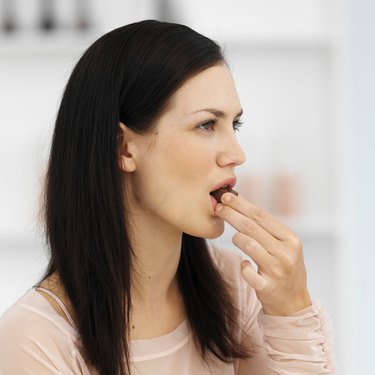
The gallbladder is a small sac under the liver that stores bile. Common diseases of the gallbladder include gallstones and cholecystitis, an inflammation of the gallbladder. Diet and food allergies can affect your gallbladder, especially if you already have a gallbladder condition. Although no specific research has linked chocolate to gallbladder attacks, fatty food like chocolate may be a potential trigger. Consult your physician before making any dietary changes.
Gallbladder Disease
Video of the Day
When you have a gallbladder disease, an acute episode of inflammation is called a gallbladder attack. During a gallbladder attack, you feel pain or tenderness when the upper right side of your abdomen is touched. Sometimes, the pain develops after certain foods are eaten, normally fatty foods. A yellowing of the skin, or jaundice, can also occur during a gallbladder attack. Nausea, vomiting and loss of appetite are other signs of a gallbladder attack or disease.
Video of the Day
Chocolate
Chocolate is believed to be a potential culprit in triggering a gallbladder attack, although no research specifically links chocolate to gallbladder attacks. Chocolate and other food high in fat can cause inflammation of the gallbladder in certain people, according to the website Netdoctor.co.uk. Research published in 1990 in the "Archives of Internal Medicine" found that women with gallbladder disease were more likely to eat unhealthy foods, like cereals, potatoes, meats, fats and oils. More research since that time has corroborated that diet plays a role in gallbladder disease.
Gallbladder and Nutrition
Some changes in your diet may help to reduce the symptoms of a gallbladder attack, according to the University of Maryland Medical Center. Your medical practitioner may test you for food allergies, which can sometimes trigger gallbladder attacks. Eat foods higher in B vitamins and iron, such as whole grains and dark, leafy vegetables. Foods higher in antioxidants like fruits and vegetables may also help to reduce gallbladder symptoms. Adding more fiber to your diet is recommended as well. Avoid red meat, refined food and alcohol. Trans fatty acids found in a number of foods, including chocolate, should also be avoided.
Research
Research has specifically linked a diet high in fat to an increase in gallbladder disease. A large-scale longitudinal study published in the "Annals of Surgery" in 2008 examined 44,524 U.S. men from 1996 to 2002 and periodically assessed their intake of saturated fat. During the research, 2,350 gallstone cases were reported. The highest risk for gallstone disease was seen in the men that ate long-chain saturated fats the most frequently. Chocolate is often high in saturated fats and it can be concluded that chocolate should be avoided based on this study.
- University of Maryland Medical Center; Gallbladder Disease; Steven D. Ehrlich; February 2010
- Netdoctor; Gallbladder Disease; Robert Diggory; August 2007
- “Archives of Internal Medicine”; A Case-Control Study of the Relationship Between Smoking, Diet, and Gallbladder Disease; Harris Pastides, et al.; July 1990
- “Annals of Surgery”; Long-Chain Saturated Fatty Acids Consumption and Risk of Gallstone Disease Among Men; Chung-jyi Tsai, et. al.; January 2008